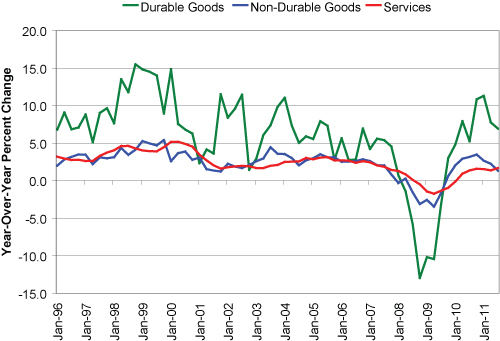Personal Wealth Management / Economics
Have Consumers Changed Their Ways?
Let’s put one theory of a fundamental shift in US consumer spending patterns in perspective.
Does it matter what consumers spend their money on? That seemingly depends on the question, or thesis, you’re exploring.
Friday, while Americans flocked to malls in search of Black Friday deals, some in the media attempted to shed some light on the subject—theorizing that while consumer spending has eclipsed its pre-recession peak, consumers’ mindsets are still affected by the 2007-2009 recession. And based on consumer sentiment surveys, one could potentially make that argument (though consumer sentiment frequently doesn’t match behavior).
But beyond sentiment surveys, some now point to consumers’ expenditures by major category—services versus goods. Looking at the data, services expenditure growth rates have lagged behind goods since the recovery began in Q2 2009—which has led to theories it indicates a new era of thrift among American consumers. After all, it might seem intuitive to assume folks would cut back on expenses in the wake of a large recession with still lingering high unemployment. But perhaps their mindsets change too.
That’s possible. But to assess this, some perspective on the data seems in order. If you want to explore whether Americans’ spending mindset has fundamentally changed, doesn’t that depend on what the trend was before? And whether services spending is typically more or less volatile than goods? Exhibit 1 shows real personal consumption expenditures’ year-over-year percent change since 1996.
Exhibit 1: Personal Consumption Expenditures by Major Category
Source: US Bureau of Economic Analysis.
The first thing that might jump out is all have grown recently. But note the 2008-2009 period in the chart. Both varieties of goods consumption (durable and non-durable) fell far more than services spending. In fact, it’s pretty easy to see goods expenditures—particularly durable goods expenditures—are a lot more variable and volatile than services.
So what does this tell you? Well, if durable goods spending fell far more during recession and is typically more volatile, is it much of a surprise it bounces back stronger after recovery begins? To us, the answer’s pretty easy—no. And when you consider durable goods spending includes things like automobile purchases, it’s even less surprising. As durable as things like cars are, wear and tear does ultimately occur, requiring replacement. So if folks abstain from replacement due to recession, it seems fairly probable they’ll replace them when economic conditions are better.
We’d also ask: Even if the theory were true, what would it mean for the US economy from a macroeconomic point of view? Probably not much, because we’d argue what’s more important is the overall direction of spending—which is up and at record highs.
Now, if you’re trying to assess what consumer-driven industries might be more in or out of favor, there might be value in analyzing spending patterns. But trying to draw major societal and macroeconomic conclusions from this seems quite a stretch to us. In our view, American consumers’ actions still show them to be overall rational creatures. And rational creatures who’ve continued spending, despite myriad worries they wouldn’t.
If you would like to contact the editors responsible for this article, please message MarketMinder directly.
*The content contained in this article represents only the opinions and viewpoints of the Fisher Investments editorial staff.
Get a weekly roundup of our market insights
Sign up for our weekly e-mail newsletter.

You Imagine Your Future. We Help You Get There.
Are you ready to start your journey to a better financial future?

Where Might the Market Go Next?
Confidently tackle the market’s ups and downs with independent research and analysis that tells you where we think stocks are headed—and why.






